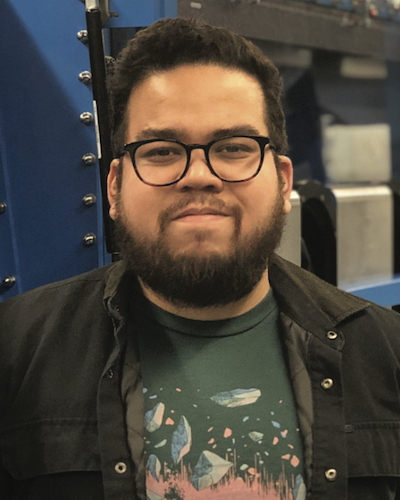Scientific sensation

Gabriel Gomes joined an elite cadre of like-minded researchers in January with a goal that sounds almost audacious. “We want to revolutionize how chemical research is done,” Gomes, freshly armed with a doctorate in organic chemistry from Florida State University, said almost matter-of-factly.
Without question, he thinks big. He also delivers. During his four years as a graduate student at FSU, Gomes did what no other FSU student is believed to have done: He co-authored 30 peer-reviewed, published papers.
“It’s amazing. It’s more than many just-tenured associate professors,” said professor Igor Alabugin, a member of the FSU chemistry faculty and Gomes’ adviser. “I think it’s unheard of.”
Gomes chose the University of Toronto to start his postdoctoral studies for one reason: to work with Alán Aspuru-Guzik, an acclaimed chemist and computer scientist who recently left a post at Harvard University to build a diverse, unique team in Toronto.
Aspuru-Guzik good-naturedly refers to the team that Gomes has joined as “the Avengers of Science.”
“Chemistry is a collaborative field, and Alán has assembled a group with all different skills,” Gomes said. “We have people from engineering, computer science, quantum computing and chemistry. It’s a diverse team.” Gomes is the team’s computational organic chemist.
Ever inquisitive, he can often be found trying to understand how chemical reactions work and how to control them.
“We’re trying to change how we approach chemistry, and in our case, chemical discovery. We use machine learning and robotics to make better reactions, better catalysts and better materials. We would like to make materials that help society.”
— Gabriel Gomes
Collaboration has been a fundamental aspect of Gomes’ research. He believes in team-building. The whole, he says, is greater than the sum of its parts.
“In chemistry, it’s hard to work alone because there are so many things that need to be done for a project to be completed,” Gomes explained. “We bring people with different specialties to help.”
Edgar Gonzalez-Rodriguez knows better than most Gomes’ approach to problem-solving. Gonzalez-Rodriguez, a research assistant at FSU who is closing in on his doctorate, was lab partners with Gomes for most of the past three years.
Gomes and Gonzalez-Rodriguez co-authored one published, peer-reviewed work. The partnership was natural: Gomes is a computational chemist and Gonzalez-Rodriguez is an experimental chemist. Their complementary skills made for a perfect fit.
“I have no doubt that Gabriel’s going to become an important person in the field in the near future,” Gonzalez-Rodriguez said. “He’s really hard-working and determined in what he wants. He works hard to reach his goals. Obviously, he’s also a pretty smart guy.”
Gomes said FSU researchers he met while still an undergraduate in his native Brazil convinced him the university would be an ideal place to pursue his graduate degrees. “It was a great move for me,” he said.
Gomes received the 2018 FSU Research and Creative Activity Award, the top award presented to a graduate student at Florida State. He also received the first IBM Ph.D. Scholarship in the university’s history and a CAS SciFinder Future Leaders Award. The last two are major international awards and significant milestones that will be inspirational for future generations of FSU students, Alabugin said.
Gomes hopes to one day return to the United States as a professor. Right now, however, he is thrilled to be a member of Aspuru-Guzik’s team in Toronto. “We’re trying to change how we approach chemistry, and in our case, chemical discovery,” Gomes said. “We use machine learning and robotics to make better reactions, better catalysts and better materials. We would like to make materials that help society.”
Alabugin has no doubt that his protégé is capable of just about anything. “Gabriel is fearless in attacking new problems... He approaches difficult problems with an open mind,” Alabugin said. “He’s willing to do things that no one has done before.”


